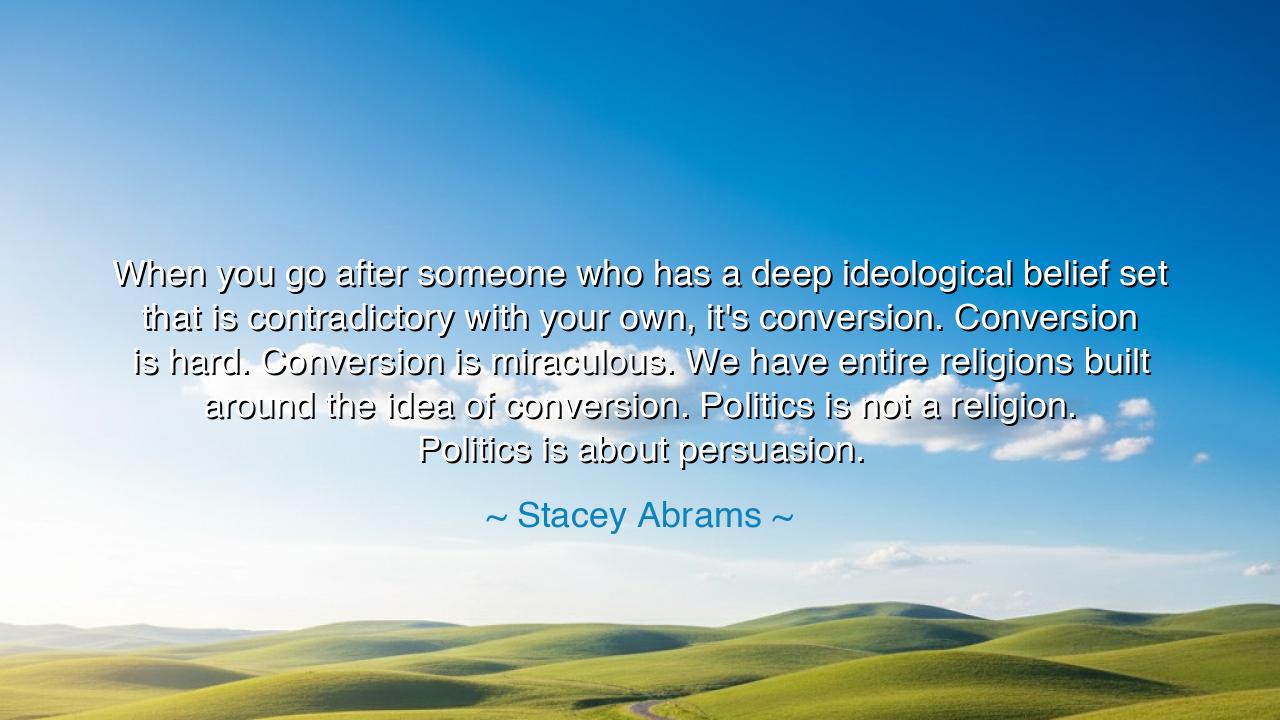
When you go after someone who has a deep ideological belief set
When you go after someone who has a deep ideological belief set that is contradictory with your own, it's conversion. Conversion is hard. Conversion is miraculous. We have entire religions built around the idea of conversion. Politics is not a religion. Politics is about persuasion.






Hear, O seekers of wisdom, the words of Stacey Abrams: “When you go after someone who has a deep ideological belief set that is contradictory with your own, it's conversion. Conversion is hard. Conversion is miraculous. We have entire religions built around the idea of conversion. Politics is not a religion. Politics is about persuasion.” In this utterance, she lifts the veil between two great human pursuits—faith and politics—and teaches that though both move hearts, they do so in profoundly different ways.
For what is conversion but the reshaping of the soul itself? When a man leaves behind his old belief and embraces another, it is not a small shift but a death and rebirth. This is why religions speak of it in miraculous tones, for the inner world is overturned, the very ground of meaning changed. Abrams reminds us that such transformation is rare, a work of fire and revelation. But in the realm of politics, where laws are written and nations are guided, the task is not to demand such miracles, but to labor instead in persuasion—the slow, steady work of opening minds, shifting opinions, and finding common ground.
History shows us the danger of confusing the two. When rulers treated politics as religion, demanding absolute loyalty, they bred tyranny. Consider the Spanish Inquisition, where belief and state were fused, and those who resisted “conversion” faced fire and sword. The result was not harmony, but fear and silence. On the other hand, when politics embraces persuasion, societies flourish. In the young American republic, the art of debate, compromise, and persuasion gave birth to a Constitution that bound together diverse states and beliefs into one nation.
Abrams’ wisdom lies in warning us not to mistake politics for religion. For in religion, the struggle is for eternal truths; in politics, the struggle is for workable solutions, for policies that can unite and sustain communities. To treat political opponents as heretics is to invite endless war; to treat them as fellow citizens open to persuasion is to keep alive the possibility of peace. Politics dies when it becomes holy war; it thrives when it becomes dialogue.
Consider also the example of Abraham Lincoln, who in the midst of civil war refused to demonize his enemies as irredeemable. He spoke of binding up the nation’s wounds, “with malice toward none, with charity for all.” He did not demand conversion to his moral vision but sought to persuade, to reconcile, to rebuild. His greatness lay in understanding that while faith may divide into believers and unbelievers, politics must seek to heal division through persuasion.
The lesson for us is this: do not treat those who disagree with you in politics as enemies of the soul. Do not seek to convert them as though they were heretics to be saved, but seek to persuade them as neighbors to be understood. Listen as much as you speak; appeal not only to reason, but to shared values and hopes. For persuasion is not conquest—it is collaboration. And when it succeeds, both sides walk away not as victors and losers, but as partners in the work of building a common life.
So I say to you, children of the future: guard against the temptation to make politics into religion. Do not demand miracles of conversion, but practice the art of persuasion. Speak with patience, listen with humility, and seek always the common ground that lies beneath the surface of division. For Abrams’ wisdom is clear: politics is not religion—it is persuasion. And in persuasion lies the power to keep the peace, to preserve liberty, and to guide nations toward justice.






AAdministratorAdministrator
Welcome, honored guests. Please leave a comment, we will respond soon